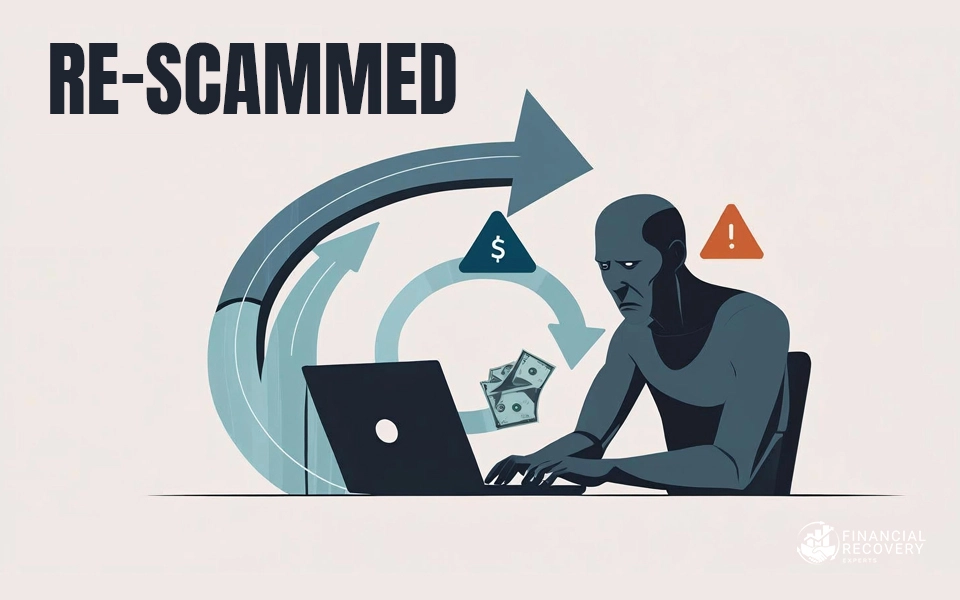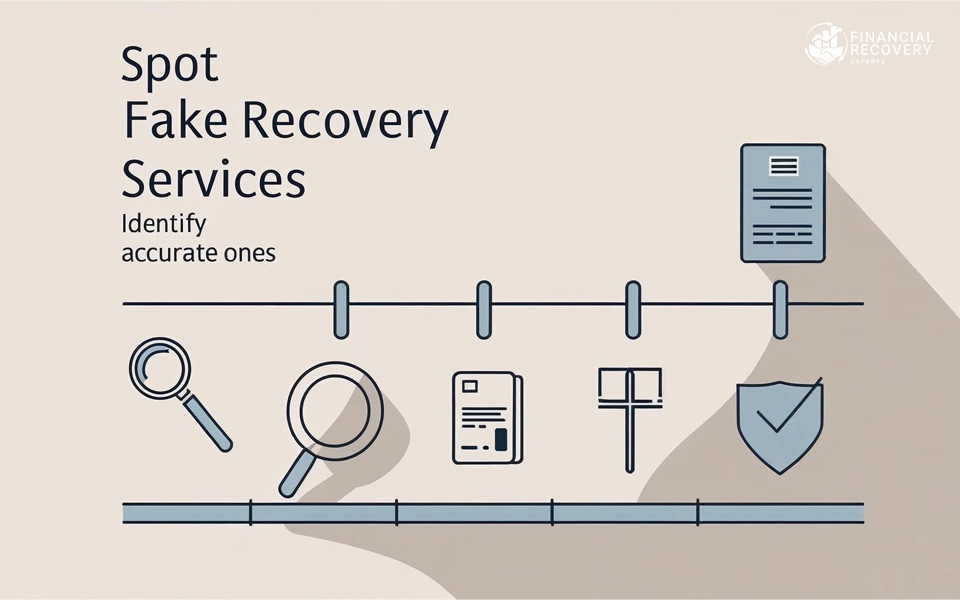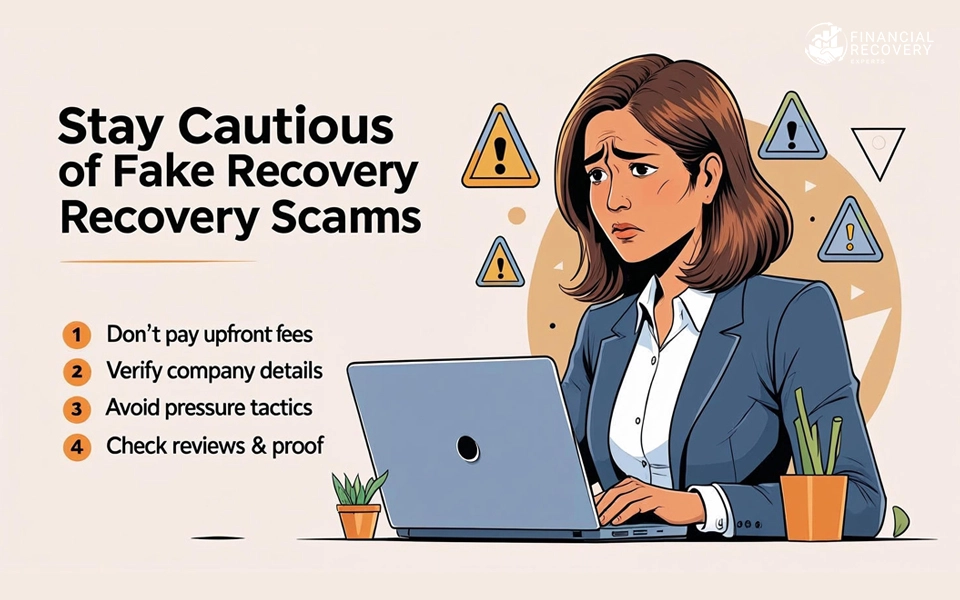
- Crypto
- August 25, 2025
Being broke after investing in the wrong platform is every investor’s worst nightmare. But what’s even worse is falling for a second scam that costs you even more. Scammers are everywhere, just waiting for you to make that one mistake. Whether it’s putting money into a fake platform or taking financial advice from strangers. All it takes is a little misinformation, and your hard-earned money is gone. Lots of scams are happening around, like pig butchering, romance scams, frozen crypto wallet scam etc.
One of the fastest-growing scams right now is the fake recovery scam. This scam targets those people who have already lost their money to a fraudulent investment. The scammer pretends to be a representative of a legitimate recovery company, promising to help you get your money back. In many cases, it’s the same person or group who is behind the original fake investment scam.
In this blog, you’ll learn what a fake recovery scam is, how it is affecting people in 2025, and most importantly, how to recognize and avoid it.
What is a Fake Recovery Scam?
Being the victim of a phishing scam, romance scam, or any other scam is already an emotionally and financially devastating experience. For many people, the shock, embarrassment, and sense of betrayal that come with the realization that they’ve been scammed can be overwhelming. In an attempt to recover their lost funds, victims often turn to what appear to be legitimate recovery services online. Unfortunately, being desperate can make them vulnerable to yet another scam: the fake recovery scam.

In this type of scam, fraudsters pose as professional recovery agents or cyber experts, claiming they have the tools and expertise to retrieve stolen cryptocurrency or funds. They specifically target victims who have already lost money in previous scams, often finding them through social media platforms, online forums, or even through data sold on the dark web.
Once contact is made, the so-called recovery agent promises to get your money back but only if you first pay a "processing fee," "investigation charge," or some other upfront cost. They may create a false sense of urgency, pressuring the victim to act quickly or risk losing everything permanently. In their desperation and hope to recover what was lost, many victims end up paying large amounts.
Sadly, after receiving the payment, the scammer vanishes, cutting off all communication and leaving the victim with even greater losses and no path to recovery. This ruthless scheme not only drains more money but also intensifies the emotional strain on people who are already vulnerable.
Recognizing the warning signs of recovery scams is crucial to avoiding falling into this trap. It is important to know how an actual recovery process looks like and what challenges are faced, which makes recovery a slow process. So, now the question arises, what genuine recovery services do. First of all, they study your case inside out. Then they evaluate the potential amount of recovery. Later, they advise you of potential legal ways you can proceed. Due to several reasons, recovery takes time.
Why is Recovery a Complex Task?
Due to a lot of reasons, genuine recovery is a complex task. A few are listed below:
- Decentralization: Cryptocurrency is not governed by any single authority, like a bank or government. Instead, transactions are recorded on a blockchain, a public distributed ledger maintained by a network of independent computers, called nodes, located around the world.
- Anonymity: All the users on the blockchain are identified by wallet address rather than personal details. When anyone gets scammed. It is difficult to identify the culprit.
- Irreversible transactions: As the word suggests, once the payment is confirmed and added to the blockchain, it cannot be undone, altered, or canceled. This is because blockchain technology records transactions in a permanent, tamper-proof ledger maintained by a decentralized network of computers.
- Cross-border issues: Crypto scammers exist across the world. Hence, the overall process, including tracing or communication, becomes slower.
If you have lost your assets to a scammer, there are various ways to recover them. However, this process is quite complicated. Before that, you must know how to identify whether the services are fake or genuine.
How to Spot the Fake Recovery Services and Identify Accurate Ones?
In search of recovery experts, there are chances of getting scammed again!

In order to avoid this scam, continue reading this article to find out how to identify fake recovery services.
1. Unrealistic Guarantees
Beware of any service that promises a 100% or very high success rate in recovering lost funds. Genuine fund recovery is a lengthy, complicated legal process, and no legitimate agency can promise to recover 100% of your losses. If you’ve lost money to a scam, the chances of getting it back are often low.
2. Poor Grammar and Suspicious Content
Check testimonials, websites, and ads carefully. Look out for grammatical mistakes, awkward phrasing, or low-quality content. Reputable recovery firms maintain professional standards in all communication, including digital ads and site content.
3. High-Pressure Tactics
Scammers often create a false sense of urgency. They push you to act fast, make quick decisions, and send money immediately. Real recovery services will never rush you into payments.
4. Untraceable Communication Channels
Fake services commonly use platforms like WhatsApp or Telegram to communicate. Genuine recovery firms operate through official emails, business numbers, or company portals, not through private messaging apps. Read more about how Telegram & WhatsApp Groups are Being Used for Forex & Crypto Scams
5. Promise of an Over-Simplified Process
If someone claims they can recover your funds quickly or within a fixed timeline, that’s a red flag. Legitimate recovery involves a thorough investigation and takes a lot of time. There’s no shortcut.
6. No Written Agreements
Real companies always provide written contracts and documented communication. If someone refuses to put anything in writing, walk away.
7. No Proven Track Record
Reputable firms proudly share their success stories, customer testimonials, and real case studies. Scam websites typically have vague or no background, no client feedback, and no verifiable experience.
8. Upfront Payment Demands
This is the biggest warning sign. Fake recovery agents will ask for money upfront and often say things like “Act now or risk losing everything.” Don’t fall for the pressure. Legitimate services either charge only after results or follow a formal payment structure.
Continue reading to learn more about how people were scammed in 2025.
Real-life example of Fake Recovery Scams in 2025
In early 2025, Marcus fell victim to a fraudulent cryptocurrency investment website. Eager to regain his money, he shared his loss on Reddit. In just a few days, he received a message on Telegram from someone asserting they were a “recovery expert.” The purported agent provided screenshots of "additional successful recoveries" and insisted on a $2,300 up-front payment to start the procedure. After making the payment, Marcus was ignored. The “agent” removed their Telegram account, and Marcus did not receive any further communication.
Total Loss: $12,500 (crypto scam) + $2,300 (fraudulent recovery charge)
The scam began on Telegram, which was the only platform the fraudster ever used to communicate. There was no official website, no verifiable contact information, and nothing to prove they were legitimate. Still, the promise sounded tempting: “We can recover your funds completely within 72 hours.”
Desperate for a solution, the victim overlooked the red flags. Every conversation took place through Telegram, and the so-called recovery agent insisted on upfront payment before starting the process. By the time the victim realized it was a trap, the money was gone, again. e
How To Stay Cautious of Fake Recovery Scams?
In 2025 there is a vast technological advancement in every sector. Hence, it is crucial to take precautionary measures in order to stay safe digitally. Following are few measures to stay safe:

-
Background Check
If you have lost your assets to any scam and are searching for any recovery services, then go through all the details of the company inside-out. Trust the platform after thorough research only.
-
Beware of impractical promises
Scammers may promise you 100% returns, but beware of the fact that money lost in a scam has very little chance of getting it back. Don't fall for such claims.
-
Avoid Haste
Getting scammed in the first place is overwhelming. Do not fall for it again. Take time to think, inquire, and research. Scammers will try their best to create urgency and convince you to make decisions in haste. Remember, this is their attempt to lure you into their second scam.
-
Stay digitally secured
Avoid sharing personal details, passwords, and OTPs with any unknown person claiming to be the representative of any recovery firm. Avoid clicking any suspicious links. Learn about how to secure your crypto wallet and avoid phishing attacks.
-
Do not pay upfront payments
Official recovery services have a systematic payment method or charge a particular percentage of the recovered amount. Avoid paying for any upfront demands.
Already scammed? Follow these steps to initiate recovery
1. Stop all contact immediately
Fake recovery scammers often keep in touch to build false trust and pressure victims into paying more. Once you suspect it’s a scam, cut off all communication by blocking their phone numbers, email addresses, and social media accounts. Continuing the conversation only gives them more opportunities to manipulate you.
2. Do not send more money
Scammers usually claim they are “almost done” recovering your funds but need extra payment for taxes, legal fees, or processing charges. Once you’ve identified a scam, no additional payment will help. Sending more only deepens the loss.
3. Document all evidence
Gather all the email threads, chat logs, screenshots, wallet addresses, transaction IDs, payment receipts, and even the scammer’s website or social media profiles. This evidence can be crucial for law enforcement or cybercrime investigators to track patterns, link cases, and potentially identify the perpetrators.
4. Report to authorities
File a report with your local police and relevant cybercrime agencies.
- USA : FBI Internet Crime Complaint Center (IC3) or FTC
- UK : Action Fraud
- India : National Cyber Crime Reporting Portal (cybercrime.gov.in)
- Australia – Scamwatch
Reporting helps authorities detect organized scam networks and may help others avoid falling victim. You can also connect and try to seek help from a few private platforms like Financial Recovery Experts. This platform may advise you if recovery is possible or not and how to proceed further.
5. Inform your bank or payment provider
If any part of the payment went through a bank transfer, credit card, or payment service like PayPal, inform them immediately. While most crypto transactions can’t be reversed, banks may flag the scammer’s account, block future withdrawals, or assist in tracing linked accounts.
6. Warn others
Share your experience on scam awareness forums, social media groups, or crypto communities. This not only warns potential victims but can also help investigators see connections between cases. The more public the scam becomes, the harder it is for scammers to keep operating under the same identity.
7. Stay digitally secure
Scammers often collect personal details, passwords, or seed phrases during their fake “recovery process.” Change all important passwords immediately, enable two-factor authentication (2FA), and run a full malware/virus scan on your devices to ensure no spyware or keyloggers were installed.
Think twice, Act Wise
In the face of online scams, a small step toward awareness can make a big difference and may even protect you from being re-victimized. Legitimate recovery platforms typically charge a percentage of the recovered amount and never demand upfront payments. Be cautious, as scammers often use tactics like fake press releases in obscure publications to appear credible. The key is to stay calm, avoid impulsive decisions, and always conduct thorough background checks before moving forward.
FAQs (Frequently Asked Questions)
Stay calm and avoid acting hastily. Do not respond to unsolicited recovery offers.Report the scam to relevant authorities or cybersecurity platforms. Document everything related to the scam for possible legal action.
Not always. Crypto transactions are irreversible, and full recovery is rare. A reputable service will give you realistic expectations based on your case.
No, scammers often pay for ads to appear trustworthy. Always research a service independently and verify their authenticity.
Scammers know that victims are desperate to recover their funds and may act emotionally. They exploit this vulnerability by posing as helpers or recovery specialists to scam them a second time.
Report to local cybercrime authorities.File a report with financial regulators or consumer protection bodies. If applicable, report to blockchain security or tracing services. Seek legal advice if a large amount is involved.